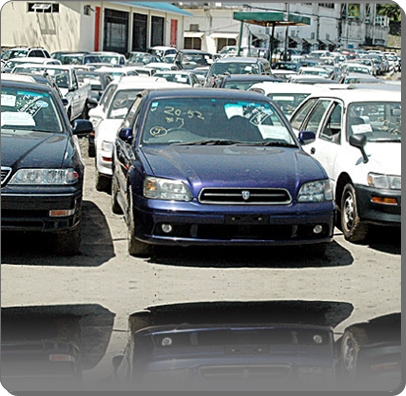President Uhuru's Duty Waiver for Cars: The Pitfalls

 |
| Cars at the Mombasa Port |
Kenyans in the Diaspora should not just jubilate about the President’s directive, but ask the government to do more in fast-tracking the improvement of cargo clearance at the port of Mombasa as well as to amend or scrap some import rules which do not augur well for importers. While the President’s directive is intended to benefit Kenyans returning home from countries where left-hand cars are a norm to buy right-hand cars in another country and have it cleared duty free, there is a rule on motor vehicle importation which makes the directive elusive unless the rule is scrapped or amended.
Remember, to qualify for a duty waiver, Kenyan returnees must have owned a car for not less than 365 days. This caveat makes Uhuru’s promise sound like Moi’s old roadside declarations. The deal sounded sweet but to me, very fictional- a returning Kenyan flies from US; lands in Uganda or Japan, and buys a right hand car which is less than 8 years and has it cleared duty free upon entry to Kenya!
First of all, the President should scrap the 8 years age caveat on all imported vehicles into the country, scrap the restriction on left-hand vehicles and 365 days ownership period. With this, we can believe his word. Let us not be brainwashed. Duty waivers have been in existence for all returning Kenyans so long as the vehicles they bring in are less than 8 years and of right-hand drive mode. I therefore challenge Kenyans in the Diaspora to first learn about our import rules on motor vehicles.
Nip corruption at the Port
The Kenya government should do more to improve on cargo clearance at the Port of Mombasa and ensure that there is integrity right from the time a consignment docks to the time it’s handed to the importer. Importers go through hell at the Port in their quest to clear cargo. Many are often compelled to bribe during the processing of import documents in the notorious “Long Room” building in Mombasa, where money speaks.
Clearing and forwarding agents often work with Kenya Revenue Authority (KRA) and Kenya Bureau of Standards (KBS) personnel to intentionally delay the clearance process by demanding bribes. The tragedy is: If an importer fails to bribe, the documentation process can be intentionally delayed to trigger a last minute rush to beat the grace period allowed for clearance. At this point, the importer is desperate and can bribe to avoid the accrual of demurrage on the cargo which increases daily after the expiry of the grace period.These are the challenges that the Jubilee government should address urgently because they demoralize all business people across the board.
Government double standards
On over-age vehicles, Kenyans are tired of double standards in the application of the law. If the over-age vehicles former Tinderet MP Henry Kosgey cleared in 2011 are still running on Kenyan roads, why can’t the law be scrapped altogether? Giving a free-hand to the ruling elite who violate the law; only to punish the “small guys” is great injustice. Our laws are meant to protect the interests of all citizens irrespective of their class or status. Worse still, there are many luxurious left-hand vehicles on the Kenyan roads; often owned by famous people, thereby amplifying the culture of double-standards in the country. One wonders how these vehicles are cleared at the port of Mombasa.
Authenticating road-worthiness on imported vehicles
On road worthiness, all vehicles imported must have a detailed inspection report from the country of origin. Secondly, we need to have standby local inspectors to authenticate what is stipulated in the foreign inspection report. If a vehicle is found to be unroadworthy, the importer should be compelled to do necessary repairs under strict supervision of the ministry of transport before the vehicle is registered and allowed to run on Kenyans roads. If the vehicle fails to meet the standards of road-worthiness, the government should decline registration and declare it as a write-off. The owner can be advised to sell it as salvage for spare parts.
Bureaucracy in a developing country kills economy
By and large, we need more automobiles on our roads to consume our oil inTurkana. Vehicle owners will pay road levies, buy insurance premiums and spare parts, employ mechanics and drivers as well as transport goods and services within Kenya and the surrounding regions. All this will improve revenue collection to boost Kenya’s economy.
We are behind in research, manufacturing and technology. It is good economics when a developing country gives room for local and foreign investors to trade in an environment of less bureaucracy and more flexibility in the exchange of goods and services. It beats no logic when a developing country is engaged in too much bureaucracy when doing business. After all, is Kenya better than Nigeria, which has fewer restrictions on the vehicles they import? Our western neighbour-Uganda does not have restrictions on automobile importation yet, they have the most organized public transport system in East Africa.
We are on low ebb economically; struggling to be at par with the emerging economies like: Hong Kong and Singapore. We can’t even manufacture a needle; leave alone a bicycle tube yet, the government want us to import newer vehicles and a total ban on left- hand vehicles into the country. Kenya is down there; decades away to even compete with the industrialised world like Japan, US, France and Germany. For me, if it’s drivable from Kilindini Port to Busia, it’s good.
By Joseph Lister Nyaringo
New Jersey, USA.
